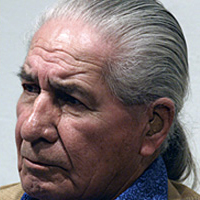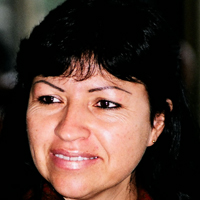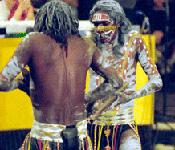 22 April 2008 MEDIA PERSPECTIVES 3rd and 4th Meetings SEVENTH SESSION UN PERMANENT FORUM ON INDIGENOUS ISSUES OFFICIAL WEB SITE LISTEN TO DAILY AUDIO BROADCASTS OF THE 7TH SESSION OF THE UN PERMANENT FORUM 22 April 2008
The dbn.tv team in Canada and Spain wishes to thank the UN Audio Library and the Recording Room for their collaboration in making these sessions available around the world UN NEWS SERVICE - INDIGENOUS PEOPLES UN PRESS RELEASES AND MEDIA COVERAGE
Economic and Social Council INDIGENOUS PEOPLES MUST BE INCLUDED IN
GLOBAL NEGOTIATIONS
As the seventh session of the Permanent Forum on Indigenous Issues
entered its second day, dozens of delegates took the floor to point
out that indigenous peoples must have a say in negotiations on how
to combat global climate change, because solutions currently being
implemented were turning out to be further violations of indigenous
rights. (complete
Press Release available here) VOICES OREN LYONS, Faithkeeper of the Haudenosaunee,
(Six Nations) noted that it was Earth Day. He went on to say that,
31 years ago, more than 100 indigenous delegates journeyed to Geneva
to brief the United Nations on the state of indigenous peoples.
Though they were survivors of a horrendous genocide, they had chosen
not to speak for themselves, but rather in defense of the natural
world. They had warned against exploitation by industrial States. In
their opening address, they had spoken of the natural world,
represented by the eagle, which, it was to be noted, had no seat at
the Palais des Nations.
AZELENE KAINGANG, Caucus Indigena de
Latinoamerica, said the industrialized countries were responsible
for global climate change, with their wastefulness and
over-consumption. The poor countries should not be blamed for the
ills produced by those with unbridled consumption. Furthermore, it
was unacceptable that those wasteful countries, who were party to
the Kyoto Protocol, should make decisions on how to control climate
change without consulting indigenous peoples. States and United
Nations agencies should adopt the recommendations in the Declaration
to address climate change and there should be immediate
implementation. Further, States must be urged to ensure the full and
effective participation of all peoples in processes that affected
them. Governments should be urged to require corporations to get
free prior consent with all the cautionary conditions. They should
also control deforestation.
|
|
Intro 2008 Opening 1st & 2nd Meetings | 3rd and 4th Meetings | 5th Meeting | 6th and 7th Meetings | 8th and 9th Meetings Kari-Oca Revisited |
dbn@dialoguebetweennations.com
Copyright Natalie Drache 1999


